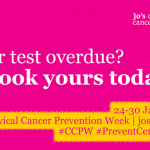How to protect yourself from the sun
Published: June 3, 2016
Jacqui Jones, Liz Nightingale and Judy Bridge, Macmillan skin cancer clinical nurse specialists, on how to protect yourself from the sun Now the summer months are here, many of us will be enjoying spending time in the sun. Exposure to the sun is important in order to keep your body healthy and encourage vitamin D […]
Bowel Cancer Awareness Month
Published: March 31, 2016
Around one in twenty people living in the United Kingdom will develop bowel cancer during their lifetime (source: www.nhs.uk). The sooner bowel cancer is detected before symptoms come about, the better the chances are of recovering from the disease. It is the second most common cause of cancer death in the United Kingdom and is […]
Ovarian Cancer – signs to look out for
Published: March 29, 2016
Around 7,000 women in the United Kingdom are diagnosed with ovarian cancer every year, making it the nation’s biggest gynaecological killer, with survival rates amongst the worst in Europe. Delays in diagnosis is one of the reasons why the UK has some of the worst ovarian cancer survival rates for women in Europe. The ovaries […]

Ground-breaking professor pays a visit to critical care research team at Heartlands Hospital
Published: March 10, 2016
The research department at Heartlands Hospital recently had a visit from Dr Sam Parnia, assistant professor of critical care medicine at the State University of New York in Stony Brook, New York, where he is also director of resuscitation research. Dr Parnia leads an extensive research programme in emergency and critical care medicine and has […]
Prostate Cancer Awareness Month 2016
Published: March 3, 2016
Prostate cancer is the most common cause of cancer in males with 119 men diagnosed every day in the United Kingdom. This month is Prostate Cancer Awareness Month aiming to raise awareness of the signs and symptoms to look out for. The disease can develop when cells in the prostate start to grow in an […]

National Heart Month 2016
Published: February 4, 2016
Every three minutes, someone in the UK will be struck by a heart attack. Anyone can have a heart attack and keeping your heart healthy, whatever your age, is the most important thing you can do to help prevent heart disease. February is National Heart Month and aims to raise awareness of heart and circulatory […]

A common problem – mouth ulcers
Published: January 28, 2016
Around one in five people in the United Kingdom get them repeatedly, they are oval sores that form in your mouth and are usually white, red, yellow or grey in colour and are inflamed. We are of course talking about mouth ulcers. Although ulcers can be uncomfortable, especially when you eat, drink or brush your teeth, […]

Cervical Cancer Prevention Week 2016
Published: January 27, 2016
Cervical cancer is the most common cancer in women aged 35 and under with around eight women in the United Kingdom diagnosed with the disease every day. The aim of Cervical Cancer Prevention Week is to highlight the importance of cervical screening, commonly known as a smear test and how attending a screening invitation can help […]

Dry January 2016
Published: January 27, 2016
2016 is here and New Year resolutions will have been made. Giving up alcohol may have been one of them. Dry January takes place this month and is aimed at encouraging causal drinkers to give up alcohol for a month after the indulgences of Christmas and New Year’s Eve. In the long term, giving up […]

How you can lose weight
Published: January 27, 2016
2016 is almost here and it is almost that time of year again where after much Christmas indulgence, people will be making New Year’s resolutions. Losing weight is one of the most common resolutions made. Being overweight can lead to health conditions such as heart disease, type 2 diabetes and stroke? Making sensible changes to […]






